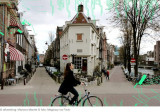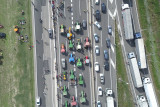Stay in the know on all smart updates of your favorite topics.
People get more connected and technology becomes part of our daily life. Between 2014 and 2015 there was a 27% growth of internet traffic in Amsterdam. Eleven out of fifteen Trans-Atlantic data cables are connected with or go through Amsterdam and the AMS-IX is the second largest internet exchange point in the world. In 2016 Amsterdam was ranked second in the European Digital City Index. Do you work on a smarter city? Share your technologies here!
Gambling with your private data

Taking a chance with your private data? Might not seem like the best idea at first thought. Still, it is something we encounter every day. With the recent controversies surrounding facebook, personal data and privacy are more relevant than ever..
In April the Black Box Bellagio was organised at Waag in collaboration with Roos Groothuizen, as part of the DECODE project. The Black Box Bellagio is a privacy casino - you don’t bet with your money but use your private data as currency instead. Three classic games could be played this evening: roulette, blackjack and poker. All with a twist involving private data. The Waag looked like a proper casino, with tables to play the games, casino equipment, and neon lights decorating the room. To finish it all off, there was even live music, played by a duo aptly called Data Sinatra.
The privacy casino
The three games part of this casino are all designed to evoke critical thinking about privacy and how we deal with personal data in our everyday life. Chance is manipulated in the roulette game, similar to how insurance companies deal with chance in real life. Boxes are blocked off based on personal identifiers such as age and address, data also used to define insurance policies. At the blackjack table, people take a chance with their facebook likes - losing to the house means having to like a random facebook page. At the poker table, data can be traded for advantages in the game. A randomised wheel decides your fate. It’s a risk, but one that many people were willing to take.
Voluntarily giving up data
What’s interesting is how readily people are prepared to provide their private data to play a game in this casino setting. Many people have become much more aware of their privacy and what happens to their personal data recently. At this casino though, caution is thrown to the wind as participating in the games takes priority over the risk of exposure. Giving up personal data seems to be easier when there’s something to gain. Or perhaps it’s just the fun and relaxed setting that makes it easier to share. In the end it all boils down to one question… how far are you prepared to go to win the game?
Want to take a chance yourself?
On 18 May, Waag will organize another edition of the Black Box Bellagio, now in De Nieuwe Anita. More information about this event can be found here: https://amsterdamsmartcity.com/events/black-box-bellagio-q3jzd5pt
Original link to article;
http://waag.org/en/article/gambling-your-private-data
Black Box Bellagio

The Black Box Bellagio - an unusual casino that won't take your money, but is after your freedom, integrity and private data instead. Play with the (un)fairness of expected values and chances, predicted risks, and giving up your identity. Disclaimer: the house always seems to win..
Play and find out which personal data you are willing to share with your fellow players. During the game you will learn to look at your personal data in an alternative way. Do you care about your privacy or about winning the game? How far do you go?
During the evening you can visit the casino between 8 pm - 1 am to play a.o. roulette, poker or blackjack. Be on time to be guaranteed of a spot at the table. Entrance is € 5,- (tickets available at the door at De Nieuwe Anita)
Algorithms, information and uncertainty
It is a well-known fact that Facebook uses algorithms to track our behavior. But what these algorithms do is commonly unknown. This creates an untrustworthy situation towards information provided by these algorithms, think about information on food, technology, news, doctors or banking. Everything is false until proven otherwise.
One of the driving forces behind a gambling game is the uncertain state of 'simultaneously knowing and not-knowing'. With poker players risk their bet by judging the value of their cards over their opponents’ by trying to deduct clues from non factual elements when playing face to face. One tries to read the opponent's behavior and facial expressions, and assess whether they’re bluffing or not.
Proof is ‘found’ in subjective predictions — a mathematical game made human. This subjectivity is surprisingly similar to profiling risks and identities through online algorithms. Think of someone who googles nail polish, who is automatically considered female. Such elements of uncertainty, insecurity and overgeneralization are indispensable for the Black Box Bellagio.
The Black Box Bellagio has been developed by Roos Groothuizen, an Amsterdam-based designer and artist, who cares about digital rights. The Black Box Bellagio has been realized in collaboration with Ymer Marinus.
DECODE
The Black Box Bellagio is organised as part of the project DECODE. Via the casino DECODE engaged a new group of people to increase awareness of the issues around personal data and data commons.
This project has received funding from the European Union’s Horizon 2020 research and innovation programme under grant agreement No. 732546.
MX3D Visitor Center

We are 3D printing a 12 meter stainless steel bridge for the City of Amsterdam.
We are creating an innovative metal 3D printing technology with a high deposition rate and almost unlimited building envelope. To show what our technology is capable of we are 3D printing a 12-meter stainless steel bridge for the City of Amsterdam.
The MX3D doors are open! This is a great opportunity for professionals and the curious-minded to learn more about the technique, the bridge project and see the robots in action.
Are you looking for an innovative experience?
Groups can book a presentation and tour at our facility.
For more info or special requests: visit@mx3d.com
We are open every Friday for walk-ins from 12:00-16:00.
If one of us is available, we are more than happy to answer (all) your questions!
Internationale kansen voor de circulaire bouw en GWW

Rijkswaterstaat wil samenwerken aan een sterke internationale positie van onze circulaire bouw- en GWW-sector. We willen gezamenlijk de internationale condities creëren om de transitie naar een circulaire bouw en GWW te versnellen. Op 29 mei van 13:00 - 17:00 uur organiseren we daarom samen met Holland Circular Hotspot een internationale circulaire economie netwerkbijeenkomst in Utrecht om internationale circulaire kansen te grijpen!
Tijdens de bijeenkomst willen we met elkaar onze ambities en behoeften in internationaal circulair ondernemen delen. Iedere deelnemer krijgt het podium om (internationale) ervaringen te presenteren en vragen te stellen. Ook delen we de CE-kansen die we in het buitenland zien en instrumenten voor internationaal ondernemen. Zo brengen we de benodigdheden in kaart, maken we de kansen concreet en gaan we met onze ambities aan de slag!
Programma
• Welkomstwoord door RWS
• Pitches: kennismakingsronde
• Circulair internationaal ondernemen voor de bouw en GWW door HCH, RVO & RWS
- Terugblik: gesignaleerde CE-kansen voor de bouw en GWW uit internationale activiteiten in Parijs, China, Luxemburg, Zuid-Afrika en Singapore.
- Lessons learned: internationale ervaringen & instrumenten voor circulair internationaal ondernemen
- Vooruitblik: aankomende internationale CE-kansen voor de bouw en GWW - Holland Circular Economy Week & Matchmaking, Innovation Expo 2018.
• Circulaire netwerkborrel
• Eind
Locatie
We ontvangen je graag in het LEF future center: Griffioenlaan 2, 3526 LA Utrecht. We sluiten rond 17.00 uur af met een borrel.
Aanmelden
Je kunt je aanmelden voor de bijeenkomst en pitch door te mailen naar circulair@rws.nl. We vernemen graag uiterlijk op 22 mei of we op jou komst mogen rekenen.
Graag tot 29 mei!
Workshop: Duidelijk over Data

Facebook beïnvloedt verkiezingen, AirBnB verstoort de huizenmarkt en datalekken zijn aan de orde van de dag. Verantwoord data & technologiebeleid is essentieel voor de digitale toekomst van Amsterdam. Hiervoor moeten de excessen worden aangepakt en coherent, visionair beleid worden ontwikkeld met ruimte voor alternatieven. Welke waarden liggen ten grondslag aan een verantwoord beleid en hoe kunnen we deze waarborgen in de praktijk? In deze hands-on workshop voor politici, beleidsmakers en andere geïnteresseerden, passen we de waarden van het Tada-manifest en de alternatieve methoden van DECODE toe op bestaande casuïstiek. Hoe ziet een veilig en verantwoord databeleid voor Amsterdam eruit?
Amsterdam Smart City is launching a self-guided innovation tour and looking for a technology partner!
The City of Amsterdam’s Chief Technology Office (CTO) and Amsterdam Smart City (ASC) receive numerous requests from international delegations interested in Amsterdam’s urban innovations and smart city projects. Delegations consist primarily of civil servants and private sector professionals but we also get requests from researchers, journalists, students and other “innovation tourists”.
In the face of rising demand, we have decided to scale our impact by providing a self-guided tour that will facilitate knowledge transfer. The tour will be launched during We Make The City Festival (20-24 June 2018). ASC will provide content for the tour but we are seeking a technology partner to help us communicate in an innovative and effective way.
Find out more in the brief attached and if interested please email a one page proposal to cornelia@amsterdamsmartcity.com by 18:00 Friday, 4 May.
Call for proposal: Amsterdam self-guided innovation tour
The City of Amsterdam’s Chief Technology Office (CTO) and Amsterdam Smart City (ASC) receive numerous requests from international delegations interested in Amsterdam’s urban innovations and smart city projects. Delegations consist primarily of civil servants and private sector professionals but we also get requests from researchers, journalists, students and other “innovation tourists”.
In the face of rising demand, we have decided to scale our impact by providing a self-guided tour that will facilitate knowledge transfer. The tour will be launched during We Make The City Festival (20-24 June 2018).
ASC will provide content for the tour but we are seeking a technology partner to help us communicate in an innovative and effective way.
Main criteria for selection:
• The solution will help ASC communicate on ~10 different innovation topics;
• The solution works with Android and iOS devices;
• The solution will help users navigate from point to point;
• The solution works offline;
• The solution leverages innovative infrastructure (e.g., beacons or JC Decaux digital marketing screens) and/or AR capabilities.
NB: Developing a new app is not feasible due to ASC’s limited budget and timeline. Therefore, we suggest leveraging existing technology.
Deadline: Your prototype is available for testing by 4 June and finalized by 20 June
Budget: Your total cost of delivery and support is less than €13,000
If you are interested in this project, then please email a one page proposal to cornelia@amsterdamsmartcity.com by 18:00 Friday, 4 May. Please include the following information in your proposal:
• Description of your solution and how it meets our needs
• Deliverables timeline and budget
If you have any questions, then please post them in the comments section below or email cornelia@amsterdamsmartcity.com.
Interviews for short listed candidates will be held during the week of 7 May and a decision will be announced by 11 May.
Food-proof cities

Afbeelding: © Visualhunt
As the number of inhabitants in Amsterdam will touch upon 1 million in the upcoming decade, the amount of mouths that need to be fed in the city will rise accordingly. Moreover, with the (re)development of areas such as Havenstad and Het Marineterrein and the ambitions for the transformation of the dense inner city into a car-free zone, there is an urgent need to (re)design the food flows in Amsterdam. How do these political decisions impact the food logistics of the city, and which innovative solutions can help make the city food-proof, now and in the future? Researchers of the AMS Institute, Aeres and the Evidence-based Food System Design group of the HvA will show their insights into the existing and future food chains of the Amsterdam Metropolitan region.
Everything you need to know about Smart Solar Bench: Innovative, Eco-Friendly and Tailored to the Smart City Concept
Whether we like it or not, we are living in the age of smart technology. Wireless technology, limitless access to online information, data collection and dissemination applications enable us to create communication networks that were hardly possible several years ago. Smart Cities are part of this technological shift in the fields of energy management, transportation, waste management and Internet of Things (IoT) for improving public services. To address the variety of services that we need in our daily urban lives, cities and municipalities are increasingly implementing smart solar urban furniture solutions.
This blog explains how a single urban furniture application (bench) can be transformed into a multi-functional platform, powered by clean energy sources, that delivers eco-friendly infrastructure of free services for citizens - Smart Solar Bench.
Any crypto / blockchain / cryptoanarchy enthusiast?
Did you miss out on Internet revolution? Don't worry, Blockchain Talks (https://blockchaintalks.io) is looking for enthusiastic actors, graphic designers, writers and ambassadors for their project! We provide you with an opportunity to build your portfolio right away as well as working on a very crucial topic nowadays - a revolutionary technology called blockchain and cryptocurrencies. Voluntary basis, some reward/recognition based on the performance.
The Data Economy - How to Succeed in a World of Data and AI

The Amsterdam Business School is honoured to invite Professor Viktor Mayer-Schönberger to speak about what companies will need to do in order to succeed in the new data economy. His lecture will take place on Friday 25 May.
Due to an abundance of data and the availability of data-driven machine learning systems, we are entering the world of the data economy, an economy in which data is replacing money as the main driver of market behavior. In this economy markets will soar, conventional firms will struggle and traditional financial institutions will face unlikely competition by small groups and individual actors. The future will be driven by data, but run by digital superstars. Avoiding this oligopolistic dystopia will require bold measures.
Event programme
18:00 – 18:45: Doors open, welcome drink
18:45 – 19:00: Welcome and introduction of Professor Mayer –Schönberger by Professor Marc Salomon (UvA - Amsterdam Business School)
19:00 – 21:00: Lecture + Q&A by prof. Mayer-Schönberger (University of Oxford)
21:00 – 22:00: Networking
Location
UvA - Roeterseiland Campus
Seminar room C.1.04
Nieuwe Achtergracht 166, 1018 WV Amsterdam
Registration
Registration is mandatory.
About Viktor Mayer-Schönberger
Mayer-Schönberger, professor at the University of Oxford is the author of over a hundred articles and eleven books on the economics and governance of information, of which the most recent is 'Reinventing Capitalism in the Age of Big Data' (translated in Dutch: 'De Data-Economie', 2018 Maven Publishing). His other international bestsellers include 'Big Data
' (co-authored with Kenneth Cukier, translated into more than 20 languages), 'Learning with Big Data' (also co-authored with Cukier) and the award-winning 'Delete: The Virtue of Forgetting in the Digital Age'.
Alpha Beta Cities: Why big-tech companies are building cities to test new markets

Ten years ago, during the “Great Recession” cash strapped cities began to outsource complex municipal projects to big-tech companies like IBM, Cisco, Oracle & Google. For these companies, city making became a new marketplace to test new products and services. What is the future of urban planning in our hyper-digital era and big-tech partnerships?
The ubiquity of smart phones and the internet of everything (ioT) is producing colossal amounts of data that becomes a blueprint of how to build sustainable and inclusive cities. Data has not only entered our homes and businesses, it’s becoming the core component to our smart cities. All of this data is giving software companies more power than ever, or, as Google’s sister company Side Walk Labs describes, it allows us to reimagine cities from the internet up leaving many architects and urban planners out of touch with the growing divide between the physical and digital domains.
Urban design, as we know it, is changing fast. Architects and planners are faced with the new reality that city officials require more innovative approaches to the challenges facing our urban environments. Master plans and zoning laws of the past are difficult to adhere to in a fast-paced era of autonomous vehicles, shared economies and climate change. With each new challenge, new partners are flooding the scene who can manage and make sense of this data but have little knowledge of urban planning.
Tech companies know more about our cities and citizens than our governments.
Between our purchase habits to point cloud scanning from self-driving vehicles, technologies make it possible for tech companies to gather huge amounts of data about us and how our cities operate. With this data “we have an opportunity to fundamentally redefine what urban life can actually be.” The lines between urban planning and business are becoming blurred. The challenge for architects and urban designers is to leverage the data to create sustainable environments for future generations, while the societal and environmental challenges of today can no longer be solved with same spatial design tools of yesterday.
When high-tech “experiments” don’t include the communities that occupy the cities, the consequences are predictable. For instance, one of the best examples today is Google’s Toronto Waterfront Development. This $1bn district will not only house Toronto’s growing tech industry, but also the new nerve center of Google Canada’s HQ. Google will be able to gather massive amounts of data. As Wired’s Susan Crawford writes: “Multitudes of sensors inside and outside buildings and on streets will be constantly on duty, monitoring and modulating. While the details of the arrangement aren’t public, the planning process is being paid for by Google, but that won’t continue unless government authorities reach an agreement that aligns with Google’s corporate interests.”
There are dozens of other examples like this. In each case, companies sell, manage and operate various municipal enterprise accounts that promise efficient, convenient, safer future cities. Some might not see this as a problem, but these smart cities are not built with commons in mind, but rather with an eye on corporate revenues and the intent to further refine product and service testing.
The good examples…
The most robust & resilient examples of smart cities are those that involve citizens throughout the process. Whether it’s Helsinki, London, Stockholm, Melbourne or New York, each of these smart cities share the vision to improve public services and quality of life through the use of disparate data that originates from various urban stakeholders.
Recently, the Royal Institute of British Architecture (RIBA) added “architecture for social purpose’ as the first topic of its latest core curriculum update. This topic encompasses the concept of understanding the social, economic and environmental benefits that architecture as a practice brings to both individuals and communities (https://architecture.com/knowledge-and-resources/knowledge-landing-page/what-is-architecture-for-social-purpose). Engineering firm Arup estimates that the global market for smart urban services will be $400 billion per year by 2020, but if these smart solutions are to work - a precondition should be to engage citizens and stakeholders as early as possible in the development.
One example of these new private / public engagements is Chicago, Illinois, USA. Chicago has harnessed data is through the Connect Chicago initiative with Cisco to enhance public safety and security despite limited budgets. Chicago’s open data portal has over 600 datasets that can be used in a number of different ways including: the development community to create local apps to improve traffic flow, businesses to develop and market services such as SweepAround.us (an app that alerts residents when street sweepers are in the area) and the City to monitor vehicles, residence smart phones, cameras and even gunshot detection.
Here in Amsterdam we are busy with innovation and new partnerships. Amsterdam boasts 20 IoT living labs, more than 250 smart city projects, more than 360 open and real time open datasets and 40,000 proactive city makers who actively collaborate in the numerous public-private partnerships. Amsterdam’s innovative ways and forward thinking has been recognized as The European Capital of Innovation Award in 2016. The city regards itself as an open platform for livability, innovation & digital social innovation. In 2017 it won the World Smart City Award for Circular Economy for its efforts to develop policy for urban-level circular economics in several areas, including: local production of sustainable and seasonal food, scores of sharing platforms, local production of electricity, reduction of fuel consumption and the improvement of waste recycling. Amsterdam is also known for IoT and bottom-up data initiatives like joint ownership and other innovative procurement processes making Amsterdam a truly inclusive city meeting the many needs of its citizens, government and business stakeholders.
Resistance to the changes that continue in city and urban planning is futile. Architects and urban designers need to embrace and even experiment with this new data and digital trends, but also get serious about a participatory process that involves private-public partnerships. We need to engage stakeholders in frank discussions about the shape of our future cities. Architects need to embrace innovation in order to remain relevant. They need to bridge the divide between cities in the classical sense that are no longer viable and engage with citizens and companies build viable cities of the future that engage citizens, utilize data and allow for flexible development.
In Amsterdam at the Innovation Exchange Lab we work directly with elected officials, citizens from and private partners to create rapid prototypes to create viable and resilient cities built by and for everyone.
Tom van Arman is an architect & urbanist based in Amsterdam who works with local governments, industry leaders and maker-communities to create living labs. Co-founder AMSiXL and director of Tapp - an award winning smart city development consortium helping corporations and local governments connect maker communities to open data, api’s & IoT solutions.
Image Credit: 10sec Animation to HBO hit series Silicon Valley. Credit yU+co, Holywood California USA
URL: https://www.yuco.com/works/silicon-valley
How are technological trends influencing your job role? Share your experience!
Hello! Are you working in Computer Science and IT, Marketing and Sales, Digital media or Design? I will highly appreciate 5 minutes of your time in completing a short questionnaire on how is your job influenced by technological developments and how do you keep on learning most efficiently in an age of excessive information.
I am conducting this research as part of my Bachelor thesis on how technological trends are influencing the current digital job marketplace and shaping the skills which professionals need. The gathered data will help me in identifying patterns across job roles in the degree to which they are changing along with technology, what are the top 3 skills for the certain role and how do you engage in learning. Moreover, the research will serve me in thinking of a solution on how to help students and recent graduates in preparing for their dream job roles and the specific skills they need.
Here is the link to the form: https://simona101.typeform.com/to/J8W5JN
Thank you in advance!
Xomnia presents: predictive models and autonomous boats

Het Amsterdamse Xomnia helpt de gemeente maximaal waarde te halen uit hun data en om meer datagedreven te werken.
Ze geven deze Demo Donderdag uitleg over een risico analyse-/voorspelmodel dat ze ontwikkelden voor een verzekeraar.
Kers op de presentatie is hun zelfvarende boot die op basis van kunstmatige intelligentie door de Amsterdamse grachten vaart.
Na de succesvolle proof of concept ontwikkelen ze dit concept door, voor een binnenvaartschip van de Shipping Factory.
Sprekers
Kaj Gruppelaar (consultant bij Xomnia), Jerome Cremers (data scientist bij DataLab/OIS) en David Woudenberg (lead autonomous bij Xomnia) vertellen over deze initiatieven.
Facebook Farewell (again)

Openbare vergadering van de Facebook Liberation Army maandag 16 april 20.00 uur in De Waag, Amsterdam.
Facebook Liberation Army is verheugd dat de beweging om Facebook te verlaten publieke aandacht heeft gekregen. Na de Cambridge Analytica onthullingen van whistleblower Chris Wylie komt #deletefacebook goed op gang. In Nederland zet de lancering van byebyefacebook.nl door Zondag met Lubach de stroomversnelling in gang.
De eerste Facebook Farewell Party vond plaats in 2015. Op initiatief van Waag en Institute of Network Cultures werd een vreugdevol afscheidsfeest georganiseerd in de Stadsschouwburg. De argumenten om Facebook vaarwel te zeggen waren toen ook al overweldigend, van privacyoverwegingen en verslavingsverschijnselen tot de vercommercialisering van vriendschap.
De vraag toen en nu is:
"Wat is het alternatief?"
Op 16 april zal deze vraag centraal staan. Wat is Mastodon en hoe werkt Signal? Bestaan Ello en Diaspora nog en hoe bevalt het daar? Wie staat er in de startblokken met een alternatief? Wat zijn de voorwaarden waar een sociaal platform aan moet voldoen? We zullen ook bespreken wat de beste manier is een Facebook-account te deleten. Niet iedereen kan zijn netwerk zomaar opgeven, heeft een eigen massamedium of marketingbudget om volgers te blijven informeren. Wat zijn de afwegingen voor personen en organisaties? Maar ook: hoe vertel ik het mijn familie en vrienden? Hebben we afkickklinieken nodig of is iedereen nu wel klaar met Facebook en is de betovering allang doorbroken?
Sluit je aan bij de Facebook Liberation Army en begin je eigen initiatief. Organiseer een meet-up of begin een Facebook Anonymous kring. Vaarwel zeggen tegen Facebook is een bevrijding, dat moet gevierd worden!
- Marleen Stikker
- Geert Lovink
Achtergrond
De Facebook Liberation Army campagne is een vervolg op de 'Unlike Us' conferenties van het Institute of Network Cultures (HvA lectoraat) en de Facebook Farewell Party die in april 2015 door o.a. Waag is georganiseerd in de Amsterdamse Stadsschouwburg.
Facebook Farewell Party (2015): fla.waag.org
New open source tool to map traffic density and destination
Who uses the street, in what way, and why? These are common questions that urban planning agencies consider every day when trying to build better cities.
That's why Sidewalk's Model Lab is launching Replica: a new modeling tool that uses anonymized mobile location data to give planning agencies a comprehensive portrait of how, when, and why people travel in urban areas.
SXSW Highlights

Did you also experience a little bit of social media jealousy last month, seeing your timeline being filled with pictures of the latest trends and innovations, the newest gear, art, music, celebs and other weirdness? Every March, tens of thousands of tech influencers and innovators, corporate hacks and computer hackers, regulators and reporters descend on Austin for SXSW Interactive, an interdisciplinary festival to celebrate and discuss the power of business, technology, and design to drive economic, environmental and social change. If you missed it, don't worry. We invited some of the Dutch highlights to fill you in on their projects and the trends in their business and drench you in the SXSW experience!
With amongst others:
John Meulemans
Founder & managing director at 3sixtyfive
Claartje Vogel
Journalist at Adfo Group / Adformatie
Chafik Benhmidouch
Founder at DOOR Creative Studio & co-founder The Living Museum
Gianna Tomiyama
Creator and curator bij ZAZA ZUSHIO & co-founder The Living Museum
Arne Koefoed
Head of Ideas at Wink & co-founder New Dutch Wave
Maarten Bloemers
Lawyer & co-founder GUTS Tickets
Babak Mirzaie
Co-founder and CEO at Expivi
Nick Yap
Co-founder Travis & founder Volareo
Black Box Bellagio

The Black Box Bellagio - an unusual casino that won't take your money, but is after your freedom, integrity and private data instead. Play with the (un)fairness of expected values and chances, predicted risks, and giving up your identity. Disclaimer: The house always seems to win.
Play and find out which personal data you are willing to share with your fellow players. During the game you will learn to look at your personal data in an alternative way. Do you care about your privacy or about winning the game? How far do you go?
During the evening you can visit the casino between 8 - 11 pm to play roulette, poker or blackjack. Be on time to be guaranteed of a spot at the table.
Algorithms, information and uncertainty
It is a well-known fact that Facebook uses algorithms to track our behavior. But what these algorithms do is commonly unknown. This creates an untrustworthy situation towards information provided by these algorithms, think about information on food, technology, news, doctors or banking. Everything is false until proven otherwise.
One of the driving forces behind a gambling game is the uncertain state of 'simultaneously knowing and not-knowing'. With poker players risk their bet by judging the value of their cards over their opponents’ by trying to deduct clues from non factual elements when playing face to face. One tries to read the opponent's behavior and facial expressions, and assess whether they’re bluffing or not.
Proof is ‘found’ in subjective predictions – a mathematical game made human. This subjectivity is surprisingly similar to profiling risks and identities through online algorithms. Think of someone who googles nail polish, who is automatically considered female. Such elements of uncertainty, insecurity and overgeneralization are indispensable for the Black Box Bellagio.
Black Box Bellagio is has been developed by Roos Groothuizen, a designer and artist from Amsterdam that works around with digital rights. Black Box Bellagio has been realized in collaboration with Ymer Marinus.
DECODE
The Black Box Bellagio is organised as part of the project DECODE. Via the casino DECODE engaged a new group of people to increase awareness of the issues around personal data and data commons.
This project has received funding from the European Union’s Horizon 2020 research and innovation programme under grant agreement No. 732546.
City Planner/Urban Designer
I am looking for a designer/designer team for a project in Shenzhen China.
personally I love dutch designers' works, especially in tactical urbanism.
So I would like to work with a dutch designer to represent an innovative
plan to my motherland China. The project is about a seaside area, 8 square km.
There will be amazing prizes up to 650K Eur. Also this is another super opportunity for dutch designs to become well-known in China.
Designers/Organizations with interest (preferably has planning and design experiences on waterfront or coastal cities) please contact me for more details.
Email: kikibauer99@gmail.com
3-Day Hyperledger Fabric Training

Hyperledger Fabric is the leading open source software platform for permissioned enterprise blockchains. Attend this intensive hands-on training course and learn how to build a full-featured blockchain application using Hyperledger Fabric 1.0.
The program is designed for developers (Golang/Java) and spans 3 full days.
Two days are essential to bring you to the level where you can start developing your own distributed application.
On the third day, attendees develop their idea into a working smart contract and application under guidance of the trainer.
You will work with an experienced trainer: Oleg Abdrashitov, Head of Requirements Working Group at Hyperledger Project.
Use promo code SMARTHYPERLEDGER for $200 off Standard ticket!
Contact the Organizers: training@altoros.com
Stay up to date
Get notified about new updates, opportunities or events that match your interests.

